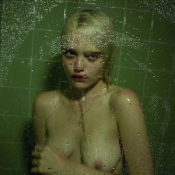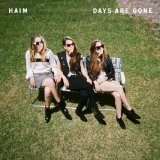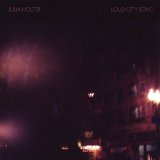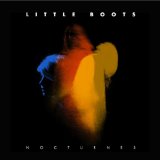We’re big fans of Anna Elizabeth Laube here at Riot Towers, so we were delighted that she was able to make a contribution to this year’s High Fives. Her album “Tree” deserved every on of the five stars it received. We were even more pleased that she did something that no featured artist has done before; she opted for five favourite videos. Here we go:
Beyoncé – Hold Up
I didn’t really understand Beyoncé-mania until her last record, Beyoncé, when the genius finally hit me. I covered her song “XO” (as did John Mayer, a version I also really like) on my most recent record, Tree. Beyoncé is a masterpiece of an album, as is Lemonade. This video for “Hold Up” sums up the contradictions implicit in this album. Playful, rageful, knowing, confused, lighthearted, heavy. Feelings. It’s gorgeous, sexy, powerful.
Maggie Rogers – Alaska
The music and images in this video are unique, fresh, inspirational. Maggie Rogers was propelled to fame by a Pharrell masterclass, but her talent and merit is all her own.
Michael Kiwanuka – Black Man In A White World
I first heard Michael Kiwanuka in a Starbucks on State St. in Madison, WI, one cold winter afternoon. This new video is disorienting, important, timely, thought-provoking.
Lady Gaga – Million Reasons
I don’t love this video as much as the rest of the ones on this list, but I love the song. One of the best new songs this year. I’m sure we’ll have an official video out soon, but for now this live performance will suffice. (Unfortunately, the video Anna chose has been blocked in the UK for copyright reasons, so here’s the official video).
Danny Denial – Sell Me Out
I moved to Seattle this year and am happy to report the music scene is alive and well. This song and video are by local pop-punk artist Danny Denial. Raw, real, precocious.
 Although her first single appeared in 2010 Sky Ferreira has never released an album before. There appears to have been a lot of music recorded over a three year period, talk of albums near to completion and exciting collaborations, but very little has ever seen the light of day. It would appear that this is mainly due to Ferreira herself not being happy to release material that record companies and interested parties want her to release and therefore becoming an artist that certain sections of the music industry would rather not have to deal with. Either she is a highly volatile personality whose ego stands in the way of her producing consistently good material (hi Azealia!) or she is an artist in the more literal sense of the word who wants to only share material that she stands by. It’s satisfying then to hear, based on this new evidence, it is almost certainly the latter.
Although her first single appeared in 2010 Sky Ferreira has never released an album before. There appears to have been a lot of music recorded over a three year period, talk of albums near to completion and exciting collaborations, but very little has ever seen the light of day. It would appear that this is mainly due to Ferreira herself not being happy to release material that record companies and interested parties want her to release and therefore becoming an artist that certain sections of the music industry would rather not have to deal with. Either she is a highly volatile personality whose ego stands in the way of her producing consistently good material (hi Azealia!) or she is an artist in the more literal sense of the word who wants to only share material that she stands by. It’s satisfying then to hear, based on this new evidence, it is almost certainly the latter.
“Night Time, My Time” is a surprisingly taut guitar, drums and synths (in that order) album, with Ferreira herself sounding bright and pouting through the majority of it. The sexuality that informs the NSFW album sleeve portrait translates into the multi-harmonies that make up the wall of sound, mid-sixties girl group album opener “Boys”. The predominant electro-pop sound that runs through the majority of her previous releases does not dominate here and this collection sounds unlike anything else released by a female singer in 2013 who is within the genre of ‘pop artist’. Whilst not a retro album, the spirit of early Blondie, Joan Jett, Siouxsie Sioux and even Kim Wilde are alive and well and it’s these kind of stand-alone punk icons that Ferreira obviously feels a kinship with.
Ariel Rechtshaid (Charlie XCX, Vampire Weekend and Glasser), who produces the entire album, excels at creating wonderfully full soundscapes which bulge with intricate details and neat sonic flourishes (listen to Haim’s thrilling “My Song 5” for an example). On songs like the snarling “Nobody Asked Me (If I Was Okay)” and “Kids In America”-mugging “Ain’t Your Right”, Ferreira and Rechtshaid give “Night Time, My Time” a genuine indie rock-pop authenticity and power as a cohesive body of work and not just an exercise in producer placement. Regardless of whether acoustic specialist Jon Brion or pop god Greg Kurstin had taken the production reins here, as it was previously assumed they might (both have worked successfully with Ferreira before), none of this would work if the songs weren’t good enough, and Ferreira has always had an excess of brilliant tunes.
Fans who may possibly mourn the overall departure of more traditional pop songs like the towering, Kylie-like “One” from 2010 can still find solace here with three nuggets of airy and gleaming brilliance: “24 Hours”, “Love in Stereo” and, in particular, the defiant “I Blame Myself”. The latter finds Ferreira accusing her detractors ‘How could you know what it feels like to fight the hounds of hell? How could you know what it feels like to be outside yourself? You think you know me so well? I just want you to realise I blame myself for my reputation’. And that still doesn’t take into account “Kristine”, a real weirdo of a track, short with deliberately hard to decipher lyrics that seem to reference shopping with said Kristine and the young millionaires with an ever
ascending melody key-line and the admission ‘even though I’m not bright, I can live in the bright town’. Its craziness is unexpected and brilliantly realised.
Ferreira has said that the album’s title comes from a line spoken by the tragic character Laura Palmer in David Lynch’s feature length film “Fire Walk with Me”, more commonly known as Twin Peaks, or at least a less successful prequel to the hugely popular TV show of that name. There is an incredibly affecting scene in the film where Laura Palmer speaks about falling in space and how eventually you would burst into flames and the angels wouldn’t save you as they are all gone. A haunting insight into the lead character’s eventual death, Ferreira incorporates this dialogue into the title track’s lyrics; the bad girl punished by death. It’s a sombre close to an otherwise uplifting and exhilarating album and musically it’s lifted straight from Tricky’s 1995 trip hop classic, ‘Maxinquaye’. It’s sticky and drunken with Ferreira coolly accepting her potential fate. This track alone confirms the risks she clearly wanted to take with her first album, it’s impossible to imagine any one of pop’s golden girls making anything as desolate sounding as this; it’s how you may expect Lady Gaga to sound if you had only seen her.
“Heavy Metal Heart” may go precisely nowhere and “Omanko” takes a novelty turn in the wrong direction but this still doesn’t prevent Sky Ferreira’s album from being a massive achievement. Her current reputation as the hipster bloggers’ poster girl is troubling as it is questionable. How much of that is due to the music as opposed to the image of a seemingly nihilistic, with occasional low self-esteem issues, ex-model? This is a pop artist, though, and image is arguably as important as sound. What Ferreira has done with “Night Time, My Time” is that she has made a record where it isn’t necessary to rely on visual props to fully relate to and enjoy the music. In that way it seems quite old fashioned and there is little doubt whilst listening to it that she loves these songs and making them come to life. If you were impressed but unmoved by some of the bigger, shinier releases from the last four months of 2013, then this album may relieve some of your pessimism. She may have taken an age to do it and it’s very early to say, but Sky Ferriera may have made one of the best albums of 2014.
 Haim are in a minority of artists who also form part of the majority where influences from chart music over the last thirty years can be heard clod-hopping all over their work but who are also pushing forward musically, and sound strikingly different from their current, retro-obsessed contemporaries. The three twenty-something sisters from LA write their own material and play their instruments, they aren’t an electronic act and neither do they aspire to be urban makeover superstars. But there are some fascinating deep and dark synths here and an R’n’B spirit is shadowing almost every song to the point where it does, albeit briefly, finally jump into the driving seat. “Tango in The Night”-era Fleetwood Mac, Prince, Sheryl Crow, The Police and eighties soft rock are the most dominant and easily-spotted influences for the Haim sisters debut though. Time and again you’ll hear these mentioned in reference to the group but importantly at the core of “Days Are Gone”, is a sound that is all theirs.
Haim are in a minority of artists who also form part of the majority where influences from chart music over the last thirty years can be heard clod-hopping all over their work but who are also pushing forward musically, and sound strikingly different from their current, retro-obsessed contemporaries. The three twenty-something sisters from LA write their own material and play their instruments, they aren’t an electronic act and neither do they aspire to be urban makeover superstars. But there are some fascinating deep and dark synths here and an R’n’B spirit is shadowing almost every song to the point where it does, albeit briefly, finally jump into the driving seat. “Tango in The Night”-era Fleetwood Mac, Prince, Sheryl Crow, The Police and eighties soft rock are the most dominant and easily-spotted influences for the Haim sisters debut though. Time and again you’ll hear these mentioned in reference to the group but importantly at the core of “Days Are Gone”, is a sound that is all theirs.
The first third of the album is home to all four heavily-promoted singles and with the possible exception of the worryingly Shania Twain tendencies of the overly-perky “The Wire” (not forgetting the Eagles “Heartache Tonight” drum intro – Ed), all still sound spring fresh, funky and with plenty of space for instruments and vocals to stretch out and sparkle. “If I Could Change your Mind” has a fidgety, skipping melody line which brings to mind freestyle electro pop from eighties artists like Cover Girls and Lisa Lisa, and the title track, a surprising co-write with UK new-house artist Jessie Ware, has plenty of tension and bustles along with an urgent agenda and rhythm.
It’s on the futuristic R’n’B of the oddly titled “My Song 5” where the band really surprise. If this were the lead single from Beyonce’s near-mythical, possibly forthcoming album or even more excitingly, another attempt at a comeback from Missy Elliott then either would be rightly lauded. Three seconds of dirgy, descending buzz bass and then massive slow pounding drums introduce vocals which mimic Wendy and Lisa doing their Purple Rain residence; dead eyed and dangerous, pitch black promising ‘honey I’m not your honey pie’. A dizzy and delirious middle eight where tight angelic harmonies flip forward and then just disappear and it’s one of the one of the most exciting and weird four minutes you’ll have experienced since the first time you heard “Get Ur Freak On”.
Continuing with the genuinely thrilling and experimental final third of “Days Are Gone” where the sound that we’d already heard from the band is both intensified and stripped away, “Go Slow” is a gorgeous and gently skulking “True Colours” but with all of the sonic fuzz wiped away. “Let Me Go” is the angriest sounding moment here, building from the sixties girl group chants in the dark into a tribal thud and clanking, dubby outro and “Running If you Call my Name” closes the album in a traditional way as a down-tempo mass of drums, guitars and those beautiful harmonies.
“Days Are Gone”, maybe more than anything else, is very welcome at this point in pop culture. Pop music is more female-driven and dominated than ever before; Gaga is eaten by Lana is eaten by Taylor is eaten by Miley. It happens so quickly and all have their place and merit but none sound like Haim. Image, although clearly very much considered, seems less of an issue to the group than the music itself, you can listen to the songs here and you don’t necessarily feel hijacked by a carefully constructed persona and brand as you may do when listening to “Born This Way” or “Video Games” say. This is a charismatic and superior release, real musical talent and love of performing that doesn’t sound cynical or short-sighted. Probably most satisfying of all, you can almost guarantee that this really is only the beginning for Haim and the best is still to come.
Out now.
 Julia Holter is still an experimental artist but this, her third album, puts her voice in a clear spotlight with the fog of last year’s outstanding “Ekstasis” having almost completely cleared with a brightness and more straightforward mood taking its place. With Holter straightforward equals a concept of sorts that references “Gigi” the book, film and musical which starred Audrey Hepburn in the title role and also contemporary celebrity culture. It’s interesting that” Loud City Song”, her most accessible album to date, shares themes that have already been appropriated by pop queens Madonna and Lady Gaga but rest assured neither generation of pop icon is likely to make an album that sounds anything like “Loud City Song”.
Julia Holter is still an experimental artist but this, her third album, puts her voice in a clear spotlight with the fog of last year’s outstanding “Ekstasis” having almost completely cleared with a brightness and more straightforward mood taking its place. With Holter straightforward equals a concept of sorts that references “Gigi” the book, film and musical which starred Audrey Hepburn in the title role and also contemporary celebrity culture. It’s interesting that” Loud City Song”, her most accessible album to date, shares themes that have already been appropriated by pop queens Madonna and Lady Gaga but rest assured neither generation of pop icon is likely to make an album that sounds anything like “Loud City Song”.
An angelic acapella cry of ‘Heaven’ is the first thing heard on “World” which slowly introduces piano and then strings with lyrics about hiding behind the brim of your hat in a city that’s too interested in you. She wants to live in a city, in her apartment block on the fifth floor, but is exhausted and bored by the intense scrutiny of strangers. Like many of the songs here, this starts quiet and pure but becomes increasingly crowded and tense as things progress. Like the climate in her native LA, occasional volatile moods can disrupt the calm but the release is restorative.
Maxim’s was the restaurant favoured by judgemental Parisian society featured in “Gigi” and there are two variations of a song named after it here which form the foundations that the remaining material sits upon. “Maxim’s I” is played in slow motion, dreamy and not fully conscious; it toughens up for a piano and violin-pricked middle eight and then dissolves again. Later on in the album “Maxim’s II” is experiencing the restaurant when it’s reservations only, noisy and overly stimulating with snatches of isolated senseless conversations ‘Tonight the birds are watching me, do they have more important things to do?’. It has a big beat and is sung-spoken by Holter in a way that is reminiscent, as is the whole track, of art-pop Grande Dame Laurie Anderson during her most commercially successful, early eighties period.
“Horns Surrounding Me” starts with a recording of a man running and breathing heavily, being chased by what can be presumed to be the paparazzi. It doesn’t disappoint with its horns pay off and is sonically grand and classical in a traditional sense. “Hello Stranger” is a cover of the Barbara Lewis r’n’b classic from the early sixties and Holter treats it as an ironic David Lynch Julee Cruise standard. Suspended keyboards and haunted vocals leading to eventual confusion and distress which is continued through to the plaintive, Angelo Badalamenti-like piano ballad “He’s Running Through My Eyes”. The throbbing double bass and deadpan repetition of the line ‘there’s a flavour to the sound of walking no one ever noticed before’ of “In the Green Wild” is all quirk and twitch in the best possible sense.
“Loud City Song” is certainly Julia Holter’s most musical album to date and is structured in a way that is, more than anything, typical of a musical play, much like its reference points. It is simultaneously very old-fashioned in its use of instruments and arrangements and modern in the way it stops short of any clear categorisation. The songwriting itself is maybe less evolved than “Ekstasis”; nothing quite matches that album’s “In the Same Room” for simplicity and immediacy, but its strengths lie elsewhere. As an artist Holter and her LA-based work keeps moving forward at a tireless, restless place and on “Loud City Song” she has made something that is intimate, warm and far more approachable than ever before.
 Last time around Little Boots lost out to La Roux and no one was expecting it. Little Boots was hyped to the point where it was inevitable that she would become, at least for a year, a Very Big Star indeed, but this didn’t materialise. Following her big, underground blog hit and debut track “Stuck On Repeat”, still many people’s favourite LB track, the first big, official song “New In Town” came with a misjudged video and after a quick appearance in the top ten, it was gone. RedOne, massive at the time because of his involvement with the newly hatched star Lady Gaga, was roped in to produce the next single “Remedy” (subsequently very popular at the Olympics I’ve been told) and again, another terrible video and another song that failed to dominate. An album, “Hands”, was eventually released to very mixed reviews (it’s actually a very solid debut) and then La Roux crept in and became the Very Big Star with a number 1 single, a number 2 album and USA success resulting in a Grammy. That was, somewhat terrifyingly, 4 years ago now and neither LB nor LR have followed up their debuts; until now that is.
Last time around Little Boots lost out to La Roux and no one was expecting it. Little Boots was hyped to the point where it was inevitable that she would become, at least for a year, a Very Big Star indeed, but this didn’t materialise. Following her big, underground blog hit and debut track “Stuck On Repeat”, still many people’s favourite LB track, the first big, official song “New In Town” came with a misjudged video and after a quick appearance in the top ten, it was gone. RedOne, massive at the time because of his involvement with the newly hatched star Lady Gaga, was roped in to produce the next single “Remedy” (subsequently very popular at the Olympics I’ve been told) and again, another terrible video and another song that failed to dominate. An album, “Hands”, was eventually released to very mixed reviews (it’s actually a very solid debut) and then La Roux crept in and became the Very Big Star with a number 1 single, a number 2 album and USA success resulting in a Grammy. That was, somewhat terrifyingly, 4 years ago now and neither LB nor LR have followed up their debuts; until now that is.
“Nocturnes” is an album that had a considerable history before it was even released; massive rows with record companies, lack of creative control and scrapped sessions finally resulting in Victoria Hesketh aka Little Boots releasing the album herself. One of the reasons for this act of ultimate control was obviously to allow Little Boots to release the album that she has been trying to make for the last 4 years with no absolutely no restrictions or compromises and this is why it is so bewildering that the end product is most definitely and disappointingly a flawed one. Little Boots knows her dance music and with co-writes from members of Hercules and Love Affair and Simian Mobile Disco and the album being produced by Tim Goldsworthy of DFA, sonically this is a change from the first album where Phil Oakey was a guest vocalist and eighties electro synth pop was cited as the main influence. There are overlaps of course but this sounds different. This is an album that wants to take its time and stretch out, languish; two tracks are over 6 mins long (and they are both mid tempos and down-hearted) but Boots is still writing 3 minute pop songs which can rattle around a bit in the overly extended time frames given to them here.
Three of the best songs on “Nocturnes” have been released before but the general tone this time is more serious. “Shake” is a straight-up chunky house track, the structure of the song, the repetition, it’s not a pop song and it holds up; you play this in a club and people dance. “Motorway” sounds like Saint Etienne (Hesketh and Sarah Cracknell also sharing similar sounding vocals) doing Bronski Beat’s “Smalltown Boy” (a good thing) and “Every Night I Say a Prayer” is old school vocal house with a lovely, dreamy piano riff. New tracks don’t do as well but “Confusion” has some lovely, intricate details and is a successful stab at disco (unlike the chicken in a basket, flabby Kylie album track, “Beat Beat”) and “Crescendo”, which is a real oddity, a pop ballad stretched out to 6 minutes that is lovely and sad for about 4 of those until it starts to morph into Natalie Imbruglia’s “Torn” and things become stretched to breaking point. The songs are here on the whole but the energy is oddly not, which is by far the biggest difference between this and her debut, and this is meant to be a dance album. Minutes go by where nothing happens and awkward synth lines or a lonely syndrum fill time where anther song could have taken their place; she must have written more than 10 in the last 4 years?
Little Boots reminds me of Cocknbullkid, another young, talented British singer-songwriter who has failed to engage with their target audience. Both are slightly self-conscious, intelligent women who can’t seem to fully inhabit the role required to be a successful pop star; arrogance and posturing is absent and it isn’t just this aspect that La Roux gets right. She is admittedly outspoken but she also has an almost instant iconic appearance which she knowingly, smartly exploits. I doubt most people could identify Hesketh by picture only, music lover or Daily Mail reader. Boots’ strength is her song writing and “Nocturnes” will establish her place in the touring circuit as a dedicated artist that needs to create and I hope she finds a way to continue to do this without becoming the massive pop star that initially it looked like she would be.


